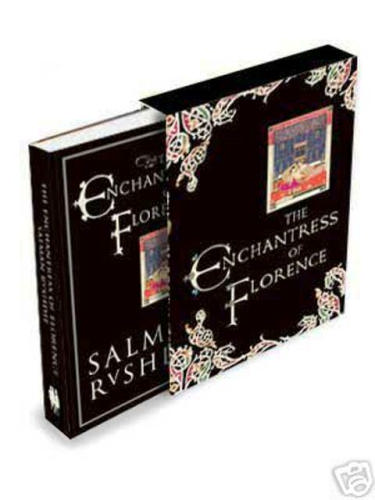
Salman Rushdie’s latest novel tells the story of the Mughal of Love, a European traveller at the court of the Grand Mughal. The stranger tells in turn (like in the Arabian Nights) the story of an enchanting woman struggling in a man’s world. The book features a plethor of famous historical names, Western and Eastern, one of them being Machiavelli.
Like other Rushdie’s books, this novel brings into question the nature of story and history, truth and/in fiction, East/West divisions and influences, there is nothing that escapes the ironic blade, or the ironic pen, or perhaps the ironic keybord.
For a moment, after reading the first chapters of Rushdie’s latest novel, I thought Rushdie was back in his element: the historical or mock-historical hochpoch that is both allegorical of our present time and yet also mock-allegorical. After stylistically mainstream Shalimar the Clown, Rushdie reverts to his old style of ever-proliferating imagery and themes. However, the book is at least haft the size of his earlier brick-books, and the excessive concatenation of imagery and witty remarks is lacking.
I enjoy the first third of the book, but only because there are some things that remind of and hark back at his earlier masterpieces. If I were cynical, after having done research on Rushdie for four years now, I would perhaps say that since Midnight’s Children Rushdie has not had a masterpiece but a series of bleak copies of this brilliant book, which is also one of the few he has written with a protagonist I like, rather than feel indifferent to. The reason for this is Rushdie’s excessively intellectualized style, his need to show off at every single point in the narrative, throwing bones to any and every possible reader, not least an academic as myself. Normally, academics like when writers repeat themes, imagery, figures of speech, etc., because then they can write about oeuvres, the particular author’s pursuit of a theme or something like that. I personally cannot stand it. Why does Rushdie find it necessary to write yet another book repeating everything that his early work contains in abundance, and on a more advanced level, funnier too.
In The Satanic Verses, Rushdie asks how newness enters the world. This ties into his suggestion in Ground Beneath her Feet that freedom to reject (to abandon tradition) is the only freedom, freedom to uphold is not. Well, all things considered, I wonder how does newness enter Rushdie, or at least his fiction. The answer is, it does not. There is nothing about religion, that old chestnut of his, that is not said better and deeper earlier. Rushdie is satisfied now with clear-cut ironic remarks in the boring telling-not-showing mode. Nothing new as far as the politics goes, or aesthetics, or nothing that conveys new, complex feelings. Everything is told, nothing shown.
There is nothing in the novel that escapes irony, especially love, and even sex. Rushdie’s descriptions of hot sex, sex that could be even controversial given the context, is impotent. If you go back to Midnight’s Children and the impotent Saleem Sinai, you will find more feelings, more eros, more anything that is missing here. Rushdie turns his sex scenes into aesthetic eunuchs.
As a death blow, in the end of the book, Rushdie provides a bibliography, a long list of books he has read in order to write the story about the Florentine enchantress that left her mark on the Mughal history. I would really have to think about this gesture as a postmodern irony and genre mockery to take it seriously to conceive it as a smart point. Rather, this is just another of Rushdie’s displays of his intelectual snobbery. Reading the titles he listed, I could not but wish I read those books instead, and not The Enchamtress of Florence. Imagine what a brilliant postmodern gesture it would be to write a short story that consists solely of a bibliography.
Pity, or maybe not. Readings like these make me desire for all new books to be submitted anonymously to publishers. Let everyone get a fair chance. This would produce a range of great literature rather than a number of literary person cults. Rushdie once criticized person cults by pointing out the ridiculousness in waging a war over a putative prophet’s hair, the sam kind of person-cult-critique that one finds in Islam as well despite the fact that it was the Muslim who waged this war. I wish he really was serious about this when it comes to literary icons which are place holders, if nothing more.
I cannot really recommend this book. If you want to taste Rushdie, try his early work, Midnight’s Children, Shame, and even The Satanic Verses if you dare, if you are looking for a sensation of confusion at what the whole deal is about. The Moor’s Last Sigh is good too though it too ontains a lot of Rushdie’s earlies pearls.


Thanks for the detailed review of Rushdie’s newest book! Too Shy to Stop writer Nehla just wrote a review too. You can read her review here.